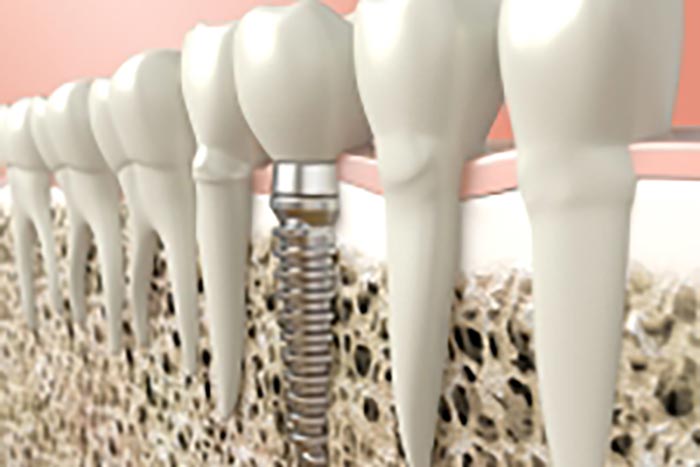Dental Implants in San Jose, California
Restore Your Smile With
Dental Implants
Are you missing one tooth? Several teeth? All of your teeth? Patients with missing teeth should know they have options when it comes to restoring their smiles. As a dental implant specialist, Dr. Askari provides the most natural and effective replacement option available on the market – dental implants.
The benefits of dental implants are impossible to ignore. Dental implants have become a desirable alternative to other methods of replacing missing tooth/teeth. Replicating the natural function and appearance of your lost teeth can be difficult to accomplish. Dental implants are natural-looking replacements for missing teeth that also provide the same function as your natural tooth.

What is a Dental Implant?
A dental implant is a small, sturdy, titanium post that acts as the root structure would for a natural tooth. A dental implant is placed into your upper or lower jaw bone. After the bone has grown around the implant, implants can hold a crown, just like roots hold natural teeth in place. Implants can also be used to support full or partial dentures, dramatically improving denture retention and stability.
Implants are very durable and can last a lifetime. They require the same maintenance as natural teeth; this includes brushing, flossing, and regular dental check-ups.
Excellent success rates and a range of available options give dentists a variety of new ways to treat and replace lost teeth.
We can evaluate your case and tell you if you are a candidate for dental implants.
Most patients with adequate bone mass can have implants, although it varies among individuals. Typically an x-ray and CT-scan are performed to determine if you have enough bone to place the implant, as well as to verify the size and kind of implant that should be placed.

Replacing a Single Tooth
If you have lost a tooth due to an accident or from periodontal disease, that one tooth can be replaced using a dental implant. A dental implant is an excellent way of replacing a single tooth without the disadvantages of a fixed bridge or removable dentures. It is the ideal treatment for a missing tooth because it does not affect your adjacent teeth. That means no grinding or crowing of your natural teeth for bridges, and no clasps for removable partial dentures.
Your teeth stimulate the surrounding bone with each bite. This preserves the integrity of the bone. When a tooth is lost, the bone is not stimulated and begins to shrink away. A dental implant keeps this bone intact and can prevent both bone loss and gum tissue shrinkage. In addition, because a dental implant replaces the root structure, the jawbone is better preserved. A dental implant is also much easier to clean as compared to a bridge. And unlike a bridge, an implant cannot be affected by cavities.
Replacing Multiple Teeth
As we age, a greater effort is required in the maintenance of our appearance. While we may force ourselves to a strict diet and exercise, many times our teeth are forgotten. Teeth are prone to deterioration after many years of use. They get worn down, chipped/cracked, and eventually, they can be lost due to physical injury or prolonged tooth decay and deterioration. Having many missing teeth is detrimental to the health and replacing these teeth is very important.
Just as with one missing tooth, several missing teeth can be aided with dental implants. Implant supported bridges are permanently fixed in the mouth, unlike removable appliances. Dental implants look and function like natural teeth without needing the support of neighboring teeth. Because dental implants replace the root of the natural tooth, they preserve the jawbone and prevent bone deterioration. This preservation of jawbone helps to keep both the bone and gum tissue from collapsing, which may lead to an unattractive smile.
In addition, with a traditional bridge, cement can wash out from underneath the bridge exposing the tooth, allowing cavities to form. Dental implants do not get cavities, but brushing and flossing are extremely important to maintain for healthy gums and help in keeping plaque away from the bone and gum tissue.
Dentures will fit more securely and comfortably with an overdenture implant. This will minimize any discomfort and movement (slipping) that is common with normal dentures. Many older adults are turning towards dental implant supported dentures for their greater comfort and confidence with dentures. Many people are often able to eat the foods they couldn’t with their old dentures.
We offer a free consultation to clearly outline the best treatment plan for you. This consultation is completely FREE to you. You have NOTHING to lose.
